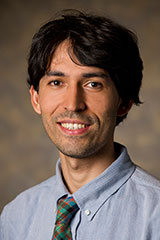Young Scholar Profile: Bumin Yenmez
 In every issue of The Bridge, we highlight a young scholar profile from our diaspora. These accomplished and early career individuals demonstrate the potential of next generation Turkish-American scientists and scholars. The young scholar in this issue is Bumin Yenmez, Assistant Professor of Economics, Tepper School of Business, Carnegie Mellon University.
In every issue of The Bridge, we highlight a young scholar profile from our diaspora. These accomplished and early career individuals demonstrate the potential of next generation Turkish-American scientists and scholars. The young scholar in this issue is Bumin Yenmez, Assistant Professor of Economics, Tepper School of Business, Carnegie Mellon University.
The Bridge: Would you please tell us about yourself and your journey that led you to become a scholar.
Bumin Yenmez: Like most of my high school friends, I decided to become an engineer after high school. I started the computer engineering department at Middle East Technical University in Ankara. However, I soon realized that I did not want to be an engineer. Then I applied to Caltech and MIT in the USA since they were more flexible about choosing a major. I was admitted to both and I decided to go to Caltech because of the weather in southern California.
I was traveling to USA for the first time on September 11, 2011 to attend the international student orientation at Caltech with two friends, Isa Hafalir and Bahattin Yildiz, who were admitted to graduate programs at Caltech. Isa Hafalir is now my collaborator and colleague in Carnegie Mellon University. While we were over Iceland in the plane, the pilot announced about the tragic events that happened in the USA that day and we had to go back to Turkey. We were able to travel again on the September 16th.
In my freshman year at Caltech, I declared mathematics as my major since I had a strong background in mathematics because I had special training for the mathematics competitions in high school. In my sophomore year I took a game theory class from Federico Echenique, which I really liked. Then I decided to double major in economics. Later in my junior year I was a teaching assistant for Federico in the game theory class and he was kind enough to advise me on a research project in the summer of my junior year. Our collaboration turned out to be fruitful and we published our findings at a respectable economics journal. (Federico and I have three joint publications now.) After this research experience, I decided to apply to graduate schools in economics, which lead to my career as a researcher in economics.
T.B. : Tell us about your research and how it is related to everyday life or other fields.
B.Y. : I mainly work in Market Design, which is an area of economics that considers specific markets in real life and improves them by redesigning how they operate. There are many applications of market design including the assignment of students to public schools, allocating donor kidneys with patients, college admissions, and etc. There are many Turkish economists working in this area including Tayfun Sonmez and Utku Unver at Boston College, Haluk Ergin at Berkeley, Onur Kesten at Carnegie Mellon University, etc. Some of my work is on diversity issues in the context of student assignment. What are the best policies to achieve diversity in schools? How can we implement them in practice? My work answers these questions. More recently, Mehmet Ekmekci and I have considered the problem of integrating charter schools in a centralized clearinghouse for student assignment. We have shown that schools always have incentives to opt out of a clearinghouse and we have come up with two schemes that achieves the desired outcome that schools opt in to the clearinghouse.
3. What do you consider important to your success? Tell us about any skills or habits that you think helped you to become a successful scholar at such a young age.
B.Y. : Luck. But to get lucky you need to work hard and focus on your research. I have worked really hard at different times of my life. Treat the graduate school as a job, put in the hours that you would in a regular job.
Life choices and habits also play an important role, you need to limit the time that you waste when you are “working”. This may especially be a challenge for researchers who work with computers all they long. You need to set limits to what and when you can do with internet, email etc. For example, it would be a good idea to read the news at home before getting to school or at night after school.
T.B. : What are your immediate and long-term goals for the future?
B.Y. : My work has been mostly theoretical so far. I would love to actually design markets in practice to improve the lives of people.
T.B. : What do you recommend to aspiring scholars, or to young Turkish scientists/scholars who are at the beginning of their careers?
B.Y. : I think it’s important to work on topics that are interesting to you rather than popular ones. Your interest will also make you passionate about what you are doing. As a result, you will enjoy working and you will get inspiration wherever you go. For example, I have found solutions to my research problems when I was taking a shower or trying to sleep in bed.
T.B. : Could you please tell us about your life outside of your work? Do you have hobbies? What are your favorite activities? If you recommend a book, what would that be and why?
I like taking walks in nature and playing soccer. I am married with two boys. I like to spend time with my family. Even though I do not read much, I like reading history and science fiction when I do. I would recommend “Games of Thrones” because it’s entertaining.